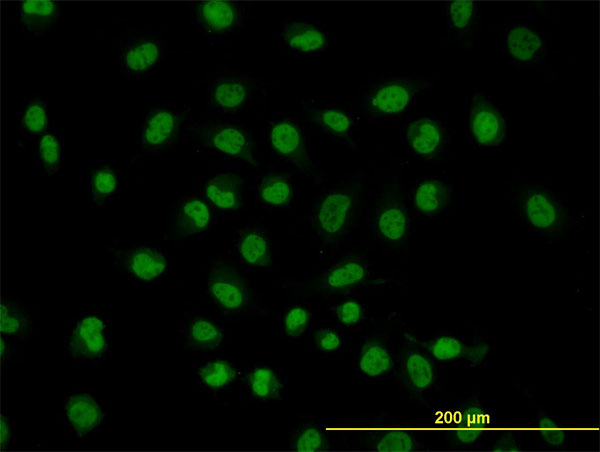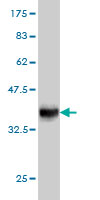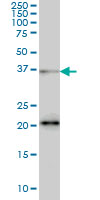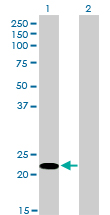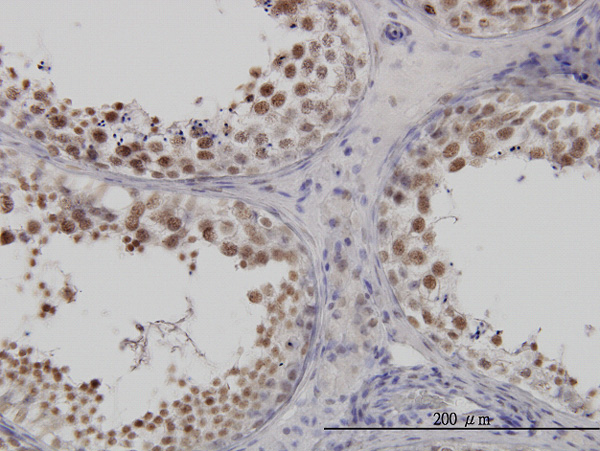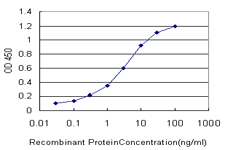FUSIP1 Antibody (monoclonal) (M03)
Mouse monoclonal antibody raised against a partial recombinant FUSIP1.
- SPECIFICATION
- CITATIONS
- PROTOCOLS
- BACKGROUND

Application
| WB, IHC, IF, E |
|---|---|
| Primary Accession | O75494 |
| Other Accession | BC005039 |
| Reactivity | Human |
| Host | mouse |
| Clonality | Monoclonal |
| Isotype | IgG1 Kappa |
| Clone Names | 1A6 |
| Calculated MW | 31301 Da |
| Gene ID | 10772 |
|---|---|
| Other Names | Serine/arginine-rich splicing factor 10, 40 kDa SR-repressor protein, SRrp40, FUS-interacting serine-arginine-rich protein 1, Splicing factor SRp38, Splicing factor, arginine/serine-rich 13A, TLS-associated protein with Ser-Arg repeats, TASR, TLS-associated protein with SR repeats, TLS-associated serine-arginine protein, TLS-associated SR protein, SRSF10, FUSIP1, FUSIP2, SFRS13A, TASR |
| Target/Specificity | FUSIP1 (AAH05039, 1 a.a. ~ 100 a.a) partial recombinant protein with GST tag. MW of the GST tag alone is 26 KDa. |
| Dilution | WB~~1:500~1000 IHC~~1:100~500 IF~~1:50~200 E~~N/A |
| Format | Clear, colorless solution in phosphate buffered saline, pH 7.2 . |
| Storage | Store at -20°C or lower. Aliquot to avoid repeated freezing and thawing. |
| Precautions | FUSIP1 Antibody (monoclonal) (M03) is for research use only and not for use in diagnostic or therapeutic procedures. |

Thousands of laboratories across the world have published research that depended on the performance of antibodies from Abcepta to advance their research. Check out links to articles that cite our products in major peer-reviewed journals, organized by research category.
info@abcepta.com, and receive a free "I Love Antibodies" mug.
Provided below are standard protocols that you may find useful for product applications.
Background
This gene product is a member of the serine-arginine (SR) family of proteins, which is involved in constitutive and regulated RNA splicing. Members of this family are characterized by N-terminal RNP1 and RNP2 motifs, which are required for binding to RNA, and multiple C-terminal SR/RS repeats, which are important in mediating association with other cellular proteins. This protein can influence splice site selection of adenovirus E1A pre-mRNA. It interacts with the oncoprotein TLS, and abrogates the influence of TLS on E1A pre-mRNA splicing. This gene has multiple pseudogenes. Alternative splicing of this gene results in multiple transcript variants encoding different isoforms. In addition, transcript variants utilizing alternative polyA sites exist.
References
A rational nomenclature for serine/arginine-rich protein splicing factors (SR proteins). Manley JL, et al. Genes Dev, 2010 Jun 1. PMID 20516191.A complex signaling pathway regulates SRp38 phosphorylation and pre-mRNA splicing in response to heat shock. Shi Y, et al. Mol Cell, 2007 Oct 12. PMID 17936706.Unproductive splicing of SR genes associated with highly conserved and ultraconserved DNA elements. Lareau LF, et al. Nature, 2007 Apr 19. PMID 17361132.Large-scale mapping of human protein-protein interactions by mass spectrometry. Ewing RM, et al. Mol Syst Biol, 2007. PMID 17353931.Global, in vivo, and site-specific phosphorylation dynamics in signaling networks. Olsen JV, et al. Cell, 2006 Nov 3. PMID 17081983.
If you have used an Abcepta product and would like to share how it has performed, please click on the "Submit Review" button and provide the requested information. Our staff will examine and post your review and contact you if needed.
If you have any additional inquiries please email technical services at tech@abcepta.com.













 Foundational characteristics of cancer include proliferation, angiogenesis, migration, evasion of apoptosis, and cellular immortality. Find key markers for these cellular processes and antibodies to detect them.
Foundational characteristics of cancer include proliferation, angiogenesis, migration, evasion of apoptosis, and cellular immortality. Find key markers for these cellular processes and antibodies to detect them. The SUMOplot™ Analysis Program predicts and scores sumoylation sites in your protein. SUMOylation is a post-translational modification involved in various cellular processes, such as nuclear-cytosolic transport, transcriptional regulation, apoptosis, protein stability, response to stress, and progression through the cell cycle.
The SUMOplot™ Analysis Program predicts and scores sumoylation sites in your protein. SUMOylation is a post-translational modification involved in various cellular processes, such as nuclear-cytosolic transport, transcriptional regulation, apoptosis, protein stability, response to stress, and progression through the cell cycle. The Autophagy Receptor Motif Plotter predicts and scores autophagy receptor binding sites in your protein. Identifying proteins connected to this pathway is critical to understanding the role of autophagy in physiological as well as pathological processes such as development, differentiation, neurodegenerative diseases, stress, infection, and cancer.
The Autophagy Receptor Motif Plotter predicts and scores autophagy receptor binding sites in your protein. Identifying proteins connected to this pathway is critical to understanding the role of autophagy in physiological as well as pathological processes such as development, differentiation, neurodegenerative diseases, stress, infection, and cancer.
